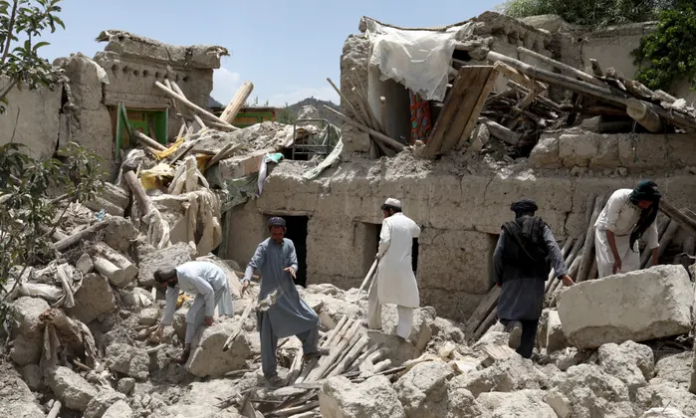After a deadly earthquake struck Afghanistan, the humanitarian crisis worsened. The international community must be proactive and mobilize to assist Afghanistan and give timely aid, which has been impeded by the threat of U.S. sanctions.
Afghanistan witnessed the deadliest earthquake in its history on Wednesday. This massive earthquake killed nearly 1,036 people and 2000 people were injured whereas over 10000 houses were partially or completely destroyed as reported by Mohammad Nassim Haqqani, a spokesperson for Afghanistan’s disaster ministry. As a result of this earthquake, more than 118000 children have been left without clean drinking water, food, and shelter.
The disaster hit Afghanistan when it has been struggling with a collapsed economy and a severe humanitarian crisis which alarmingly worsened after the earthquake. After the earthquake, the Taliban-led government appealed for aid from the International community. The disaster response became a challenge for them as they took over after two decades of war.
The rescue operations were delayed due to poor communication and the lack of proper roads. The Afghans also lack technical support and rescue facilities. The natives had to dig with their hands to take people out of the rubble.
Mohammad Ismail Muawiyah, the spokesperson for the Taliban military commander in Paktika province said, “We can’t reach the area, the networks are too weak, we are trying to get updates”
The country director for World Food Programme in Afghanistan Gordon Craig said “The Afghan people are already facing an unprecedented crisis following decades of conflict, severe drought, and an economic downturn,”
“The earthquake will only add to the already massive humanitarian needs they endure daily.”
Following the developing crisis, the spokesperson for the Afghan foreign ministry Abdul Qahar Balkhi repeated calls for International aid on Thursday.
After the US exit from Afghanistan, last year in August, the Taliban took over the government, and the international aid was halted because of the fear of U.S. sanctions. The U.S. also froze about $9 billion of Afghanistan’s central bank assets that were being held in the Federal Reserve Bank of New York leaving Afghanistan’s economy in an impoverished state and in dire need of aid. This earthquake has only made the situation worse leaving thousands of people without shelter and food.
The current situation has tightened humanitarian aid in Afghanistan because international non-governmental organizations (NGOs) are unsure whether they can carry out their operations in Afghanistan and whether they will be sanctioned for sending humanitarian aid. Afghans based abroad are also having trouble making donations as the Afghan banking system has largely collapsed under the weight of international sanctions. Some senior Taliban leaders are subject to sanctions on terrorism charges, complicating rehabilitation.
“The formal banking system continues to block transfers due to excessive de-risking, impacting payment channels and causing breakdowns in supply chains,”
“The sanctions imposed after the Taliban takeover … and the economic collapse will make it incredibly difficult to respond with necessary medical and food aid, and to support reconstruction,” said Ashley Jackson, co-director of the Centre on Armed Groups.
Countries including South Korea, Pakistan, and Japan came forward to help Afghanistan. Planes filled with medical supplies and aid from Iran, India, and the United Arab Emirates began arriving early Friday, according to Mr. Mujahid, the Taliban spokesman.
“The aid that has been given to the people is enough for 10 to 15 days, but they have lost everything and there is a constant need for cooperation from international aid agencies,” Mr. Mujahid said.
Afghanistan is struck by the worst drought in 30 years, massive poverty, and a collapsed economy as the bank operations in Afghanistan took a major hit and the financial operations were either halted or heavily reduced. The organizations are facing issues as they struggle with the financial aspect of humanitarian relief.
“Aid organizations are doing all they can, but with one of their hands tied behind their back,” Baheer, an Afghan volunteer said.
For the Afghans food, health, and now even shelter is also a major concern as the earthquake destroyed over 10,000 houses and reconstruction is out of the question. Under such circumstances, the international community needs to rethink the policies and devise strategies for rehabilitation.
“The question is, will this disaster make the international community question the harmful costs that its policies are having on ordinary Afghans?” said Jackson.
The world needs to be proactive and take timely action to help Afghanistan in the current crisis situation and also develop a long-term plan for assistance. The current aid is insufficient for the sustenance of the Afghans.
Adnan Junaid, International Rescue Committee Vice President for Asia, added: “The international community must … establish a roadmap that sets out strategies to resume development assistance, provide technical support to the central bank, and ultimately release Afghanistan’s foreign exchange reserves.”
Abdul Qahar Balkhi, a Taliban foreign ministry spokesman in Kabul while talking to Voice of America said “But even more crucial for [the] U.S. to end callous attitude towards lives of Afghans by lifting sanctions and unfreezing Afghan assets so people can rebuild their lives destroyed by two-decade occupation and this latest natural disaster”.




